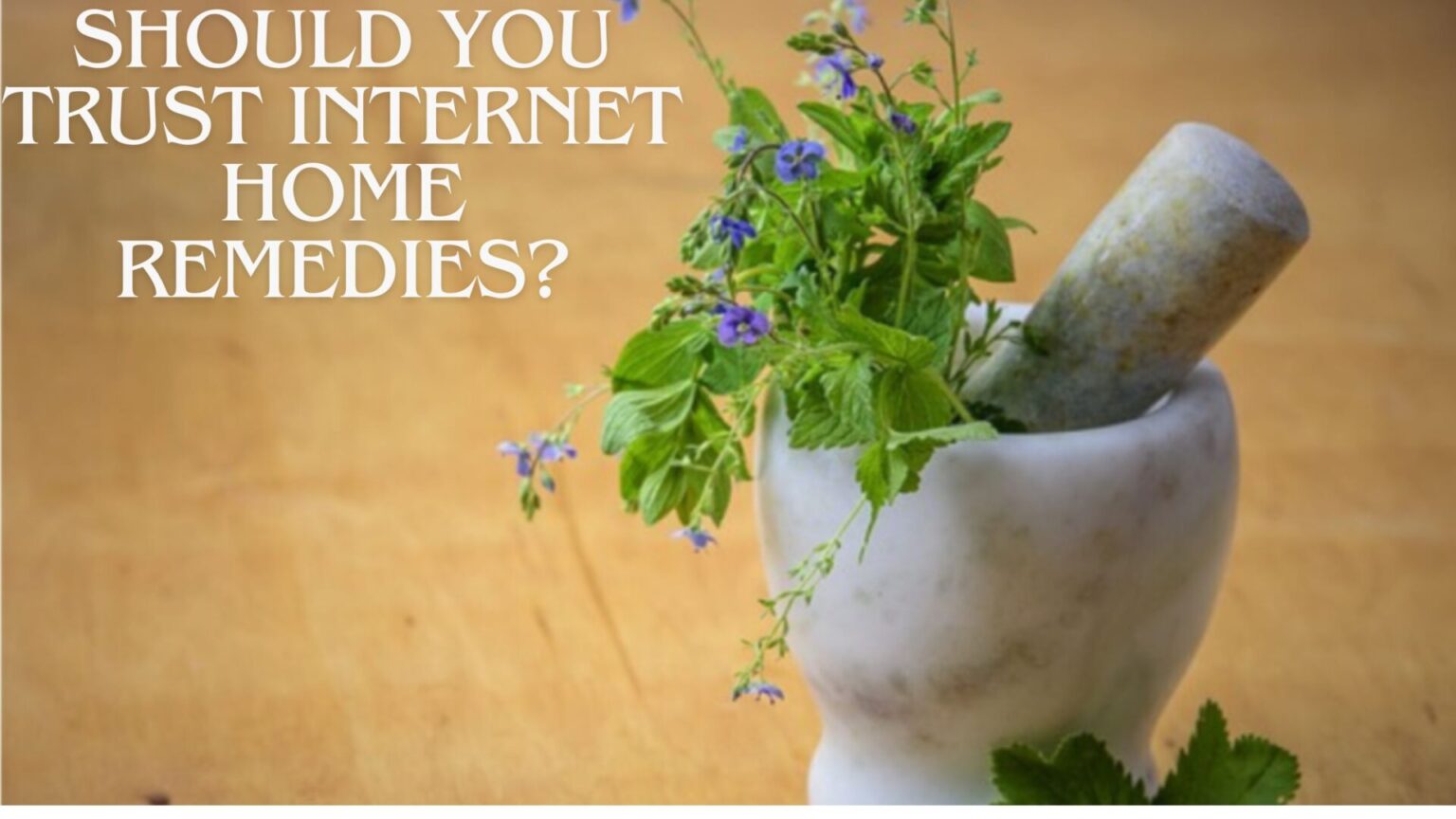Introduction
Should You Trust Internet Home Remedies?

In today’s digital age, the internet serves as a vast repository of information on virtually every topic imaginable. From cooking recipes to DIY home improvement, and yes, even home remedies for various health concerns, you can find a plethora of advice at your fingertips. However, when it comes to health, it’s crucial to exercise healthy skepticism and discernment. This article explores the topic of trusting internet home remedies and provides guidance on making informed decisions for your well-being.
The Proliferation of Internet Home Remedies?
The internet has democratized information, allowing anyone to share their knowledge and experiences. This openness has led to an explosion of home remedy recommendations for common health issues. Websites, forums, social media platforms, and video-sharing platforms are filled with tips, tricks, and testimonials on how to alleviate symptoms, treat minor illnesses, or even cure chronic conditions using ingredients readily available at home.
The Appeal of Internet Home Remedies
- Accessibility: Internet home remedies are accessible to anyone with an internet connection. You can access advice 24/7 from the comfort of your home.
- Affordability: Many home remedies involve ingredients that are affordable and readily available, such as honey, ginger, and baking soda.
- Natural Approach: Internet home remedies often emphasize natural and holistic approaches to health, which can be appealing to those seeking alternatives to pharmaceuticals.
- Empowerment: Following a home remedy can give individuals a sense of control over their health and well-being.
The Need for Healthy Skepticism
While internet home remedies may offer several benefits, they come with inherent risks and challenges. Here are some reasons why exercising healthy skepticism is crucial:
- Lack of Regulation: The internet is not regulated in the same way that pharmaceuticals and medical treatments are. Anyone can post health advice, regardless of their qualifications or the scientific basis of their claims.
- Varied Quality of Information: The quality of health information online varies widely. Some remedies may be backed by scientific research, while others are purely anecdotal.
- Safety Concerns: Not all home remedies are safe. Some may interact with medications, exacerbate existing health conditions, or cause adverse reactions.
- Misdiagnosis: Relying solely on internet home remedies may lead to misdiagnosis or delayed treatment for serious health issues that require medical attention.
- Individual Variability: What works for one person may not work for another due to individual differences in health, genetics, and lifestyle.
How to Approach Internet Home Remedies Safely?
- Consult a Healthcare Professional: Before trying any internet home remedy, especially for chronic or serious conditions, consult a healthcare professional. They can provide guidance, ensure the remedy is safe for you, and monitor its effectiveness.
- Research Thoroughly: If you’re considering a home remedy, do thorough research. Look for reputable sources, scientific studies, and expert opinions to validate the remedy’s effectiveness and safety.
- Consider the Source: Evaluate the credibility of the source providing the home remedy. Is it a reputable healthcare website, a medical professional, or an anonymous forum post?
- Look for Consensus: If multiple sources agree on the effectiveness of a particular remedy, it may carry more weight. However, be cautious if the remedy has no scientific consensus.
- Beware of Red Flags: Be wary of remedies that promise miraculous cures, lack scientific explanations, or make unsubstantiated claims. These are often red flags of dubious information.
- Start with Caution: When trying a new home remedy, start with caution. Use it sparingly, and discontinue if you experience adverse effects.
- Monitor Progress: Keep track of your progress when using a home remedy. If there’s no improvement or your condition worsens, seek professional medical advice promptly.
Balancing Holistic and Conventional Approaches
Healthy skepticism doesn’t mean dismissing all home remedies. Many have been proven effective through scientific research. However, it’s essential to strike a balance between holistic approaches and conventional medicine. Consult with healthcare professionals who can provide evidence-based guidance while incorporating safe home remedies that align with your overall wellness plan.
Home Remedies Online Are They Safe, Effective, and Evidence-Based?
The safety, effectiveness, and evidence-based nature of home remedies found online can vary significantly depending on the specific remedy, the source of the information, and the individual’s health condition. Here’s a closer look at each aspect:

1. Safety:
Safety should always be a top concern when considering home remedies. While many home remedies are safe and have been used for generations, others can pose risks, especially if not used correctly. Here are some key considerations:
- Source Reliability: The safety of a home remedy often depends on the credibility and expertise of the source. Remedies suggested by reputable medical websites or healthcare professionals are generally safer than those from unverified sources.
- Allergies and Sensitivities: Individuals may have allergies or sensitivities to certain ingredients used in home remedies. It’s essential to be aware of any potential allergic reactions and perform a patch test if necessary.
- Interactions with Medications: Some home remedies can interact with prescription or over-the-counter medications. Always consult with a healthcare professional, especially if you are taking any medications.
- Dilution and Dosage: Improper dilution or dosage can lead to adverse effects. Ensure you follow instructions carefully and do not exceed recommended amounts.
- Monitoring for Adverse Effects: When trying a new home remedy, pay close attention to any adverse effects or unexpected reactions. If any negative symptoms occur, discontinue use and seek medical advice.
2. Effectiveness:
The effectiveness of home remedies can vary widely depending on the remedy’s type, the condition it’s meant to address, and individual factors. Here’s what to consider:
- Scientific Evidence: Some home remedies have a solid scientific basis and have been studied extensively. These remedies are more likely to be effective. Others may lack scientific backing.
- Individual Variation: What works for one person may not work for another due to differences in genetics, health conditions, and lifestyle factors. Effectiveness can be subjective.
- Severity of the Condition: Home remedies are typically best suited for minor, self-limiting conditions such as colds, minor skin issues, or indigestion. For more serious or chronic conditions, professional medical advice is essential.
- Time and Patience: Some home remedies may take time to show results. Patience is often required when using natural remedies.
3. Evidence-Based Nature:
The term “evidence-based” refers to medical practices and treatments that are supported by scientific evidence from well-designed studies and research. When evaluating the evidence-based nature of a home remedy, consider the following:
- Scientific Research: Some home remedies are backed by scientific studies demonstrating their effectiveness. In such cases, the remedy can be considered evidence-based.
- Traditional Knowledge: Many home remedies have been passed down through generations based on anecdotal evidence and traditional knowledge. While these remedies lack formal scientific studies, they may still have value.
- Anecdotal Evidence: Personal testimonials and anecdotes can be informative but should be taken with a grain of caution. They do not substitute for rigorous scientific research.
- Consulting Professionals: When in doubt about the evidence-based nature of a home remedy, consult healthcare professionals. They can provide guidance based on their medical expertise and access to the latest research.
Conclusion
The internet can be a valuable resource for health information and home remedies, but it can also be a source of misinformation and potential harm. Healthy skepticism is the key to making informed decisions about which internet home remedies to trust and incorporate into your healthcare routine. Prioritize your safety and well-being by consulting healthcare professionals, conducting thorough research, and being discerning when evaluating the credibility of online sources. Ultimately, a balanced approach that combines both holistic and conventional methods is often the most effective way to maintain your health and well-being.
FAQs:
Q1: What are internet home remedies?
A: Internet home remedies are treatments and solutions for various health issues that people share online. These remedies often use common household items, herbs, and natural ingredients.
Q2: Are all internet home remedies safe to try?
A: Not all internet home remedies are safe. Some may be based on anecdotal evidence rather than scientific research. Always consult a healthcare professional before trying any new treatment, especially if it involves ingesting substances or applying them to your skin.
Q3: How can I identify reliable sources for home remedies online?
A: Reliable sources typically include websites from reputable health organizations (e.g., Mayo Clinic, WebMD), peer-reviewed journals, and advice from licensed healthcare professionals. Look for evidence-based information and avoid sites that make overly broad or miraculous claims without supporting evidence.
References:
- Mayo Clinic – Provides expert advice on a wide range of health topics and home remedies, backed by scientific research.
- WebMD – Offers detailed information on home remedies and their effectiveness, including potential risks and benefits.
- National Center for Complementary and Integrative Health (NCCIH) – A government resource for information on alternative and complementary medicine.
- PubMed – A database of scientific studies and clinical trials where you can search for research on specific home remedies.
- Healthline – Provides articles reviewed by medical professionals on various home remedies and their safety.






